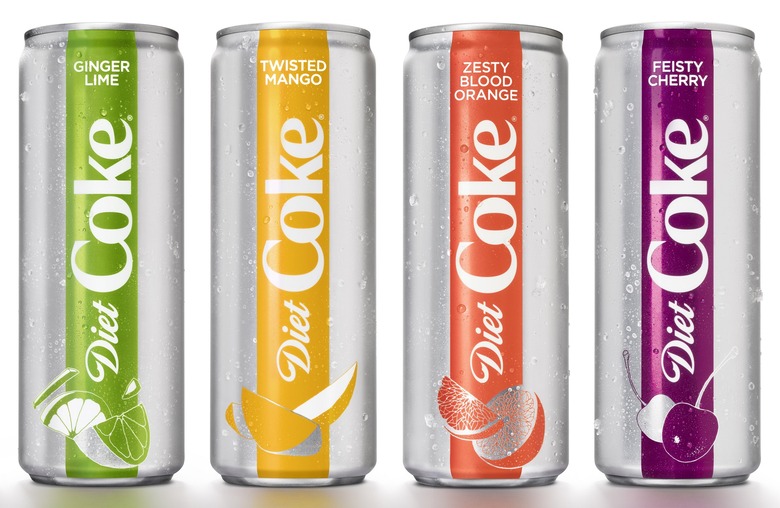Diet Coke's New Flavors Contain Controversial Ingredient 'Ace-K'
When we tasted the prettily-packaged new Diet Coke flavors, a few of us gagged after the first gulp. The four new sodas are really sweet — a quality that might have stemmed from an artificial sweetener we hadn't known was there. "Ace-K," an artificial sweetener that's a jarring 200 times sweeter than regular refined sugar, is one of the ingredients in the new flavors — and the inclusion is stirring some controversy.
Historically, Coca-Cola has relied on an equally contentious sweetener called aspartame for some of it's diet offerings. Aspartame is 160 to 200 times sweeter than sugar and its impact on health has been a subject of considerable debate, with some health advocates claiming that it causes cancer and other issues while the Food and Drug Administration concludes that it is safe. The zero-calorie sweetener has been used for decades at Coca-Cola, allowing Diet Coke to deliver what their North America group director Rafael Acevedo calls a "crisp taste."
While the sweetener in the original Diet Coke hasn't been changed, for the new flavors Zesty Blood Orange, Twisted Mango, Ginger Lime, and Feisty Cherry, however, Coca Cola added acesulfame potassium, or "Ace-K" for short, to achieve their newly-desired level of sweetness. Acevedo explained to Fortune that when Coca-Cola tested these new flavors to target millennial consumers, they found the product tasted too sour.
"We wanted to make sure we maintain that crispness," Acevedo said .
But some scientists say Ace-K hasn't been proven to be risk-free. Opponents of Coca-Cola's use of the sweetener argue that not enough research has been conducted on Ace-K to assure safety for frequent soda drinkers.
"It's a sleeper that no one pays attention to," Michael Jacobson, president of the Center for Science in the Public Interest, told Fortune. "I don't think either side can say definitively it's safe or dangerous." Some scientists have asserted that further testing is needed to rule out health risks.
Despite the swirling concern that the sweetener might be more dangerous than soda companies let on, the FDA did approve the ingredient in 1988. According to the FDA website, "More than 90 studies support its safety."
Coca-Cola has used Ace-K before, as a complement to aspartame in Coke Zero Sugar. That brand is intended to be a sweeter alternative to Diet Coke, closely mimicking the original Coca-Cola flavor.
The Daily Meal has reached out to Coca-Cola for comment.
Even if this sweetener is OK for consumption, we'd like to have known before we took a sip. Click here for 10 more things you might not have known about Coca-Cola.
